中西方文化差异英文版ppt课件(0002)
合集下载
中西文化差异(英语PPT)
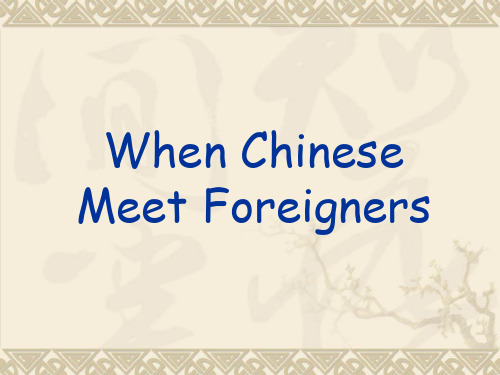
When their leader against their views. Western: They think they are equal to their leader.If their idea is right,even though their leader against them, they won't compromise. China: In a word,
In the morning,they happen to meet each other in the way to company. Western: China: Contrarily,foreingners Usually,we will say"你吃 了吗?"or"去哪?".In fact, don't like to be asked about the questions we don't really want to related to private kown these,we just want massages.They would say to convey our caleness "How are you?"or say"How for others. do you do?"in the first time they meet others.
When they have conflict with their partner,and then they are unsatisfied with their partner. Western: They will express what he think,even if to do like this might make others feel uncomfortable. China: We won't express our angry easily,because to do this will be regard as being rude.
中西方文化差异英文版ppt课件
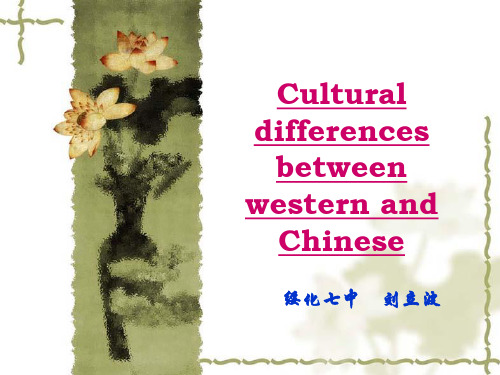
例题(33)_______teachers can sit on the desk havi teaching work. A. British B. Chinese C. American D. Japanese
例题(40)The first dish for American and British people is____. A. soup B. fish C. meat D. potato and tomato 例题(41)______people like to eat the amimal’s hearts. A. Chinese B. American C. British D. None of the 例题(43)When you send some expensive presents to American and British people, they receive them_______. A. silently B. without doing and saying anything C. and take them away in silence D. and sing high praise for them in the face of the sender 例题(44)The American and British people are tired of No.______. A. 8 B.4 C.5 D.13 例题(46)Waitresses and waiters in_____usually receive tips(service charge)at shops or restaurants. A. China B. Britain C. America D. all three countries
中西方文化差异英文版-PPT文档资料17页
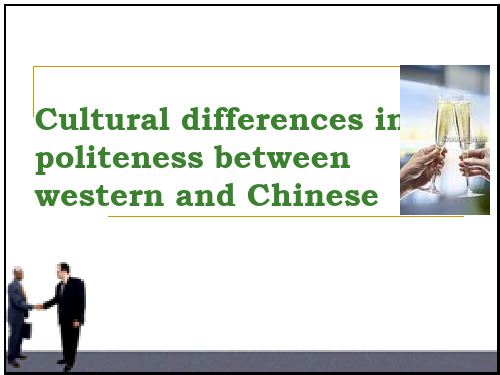
Cultural differences in politeness between western and Chinese
1.Greeting and Parting
• In China, When people meet acquaintances or friends, we always say ,“Have you eaten yet?” What are you going to do?”
East&West
when we talk to the westerns, we must avoid asking some questions like this:
“How old are you?” “Are you married?” “How many children do
4. Thanks and Responses
In China,“Thank you” is not frequently used between intimate friends and family members because it may imply a certain distance between the addresser and the addressee.
• In English, people often employ the following expressions to greet each other “Good morning/evening/afternoon. “Fine day, isn’t it? ”How is everything going?”,etc.
Different cultural factors may result in cultural differences.
1.Greeting and Parting
• In China, When people meet acquaintances or friends, we always say ,“Have you eaten yet?” What are you going to do?”
East&West
when we talk to the westerns, we must avoid asking some questions like this:
“How old are you?” “Are you married?” “How many children do
4. Thanks and Responses
In China,“Thank you” is not frequently used between intimate friends and family members because it may imply a certain distance between the addresser and the addressee.
• In English, people often employ the following expressions to greet each other “Good morning/evening/afternoon. “Fine day, isn’t it? ”How is everything going?”,etc.
Different cultural factors may result in cultural differences.
中西方文化差异英文版-PPT精选文档17页

In an informal situation, westerners will introduce each other by first name, without titles, and occasional ly by just the last name.
East&West
Chinese use “title +surname” to address their superior or elders rather than call them surnames, while the superior or elders call the addressers their names. otherwise, the addresser may be considered as ill mannered, ill educated or rude.
pliments and Response
For example, if a hostess is complimented for her cooking skill ,how she will response in west and china?
East&West
A Chinese hostess will apologize for giving you “Nothing”. She will say“I just made some dishes casually and they are not very tasty.”
“Thank you” is widely used in English to show gratitude in such cases as being invited, helped, given a gift, etc.
East&West
Chinese use “title +surname” to address their superior or elders rather than call them surnames, while the superior or elders call the addressers their names. otherwise, the addresser may be considered as ill mannered, ill educated or rude.
pliments and Response
For example, if a hostess is complimented for her cooking skill ,how she will response in west and china?
East&West
A Chinese hostess will apologize for giving you “Nothing”. She will say“I just made some dishes casually and they are not very tasty.”
“Thank you” is widely used in English to show gratitude in such cases as being invited, helped, given a gift, etc.
中西文化差异英文PPT幻灯片

7
East&West
A Chinese hostess will apologize for giving you “Nothing”. She will say“I just made some dishes casually and they are not very tasty.”
An western hostess is likely to say,” Oh, I am so glad that you liked it. I cook it especially for you.”
may be considered as ill mannered,
ill educated or rude.
equal”
6
pliments and Responses
For example, if a hostess is complimented for her cooking skill ,how will she response in west and china?
1.“I am afraid I must be off, I have to …” 2.“Well, it’s been nice to see you again. I do enjoy our
talk and the lovely dinner, but I must be going soon”. 3.“Thank you very much for asking me over. I hope
5
East&West
In east, chinese use “title
In west, Although they are different
East&West
A Chinese hostess will apologize for giving you “Nothing”. She will say“I just made some dishes casually and they are not very tasty.”
An western hostess is likely to say,” Oh, I am so glad that you liked it. I cook it especially for you.”
may be considered as ill mannered,
ill educated or rude.
equal”
6
pliments and Responses
For example, if a hostess is complimented for her cooking skill ,how will she response in west and china?
1.“I am afraid I must be off, I have to …” 2.“Well, it’s been nice to see you again. I do enjoy our
talk and the lovely dinner, but I must be going soon”. 3.“Thank you very much for asking me over. I hope
5
East&West
In east, chinese use “title
In west, Although they are different
中西方语言文化差异英文PPT
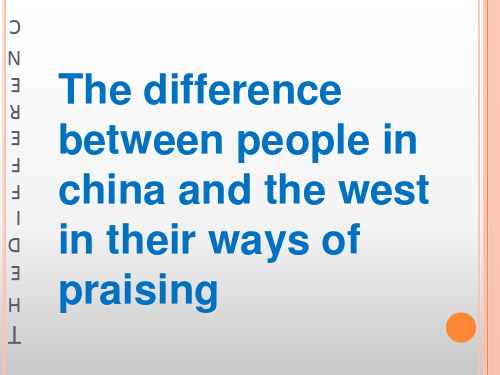
In Chinese culture, praises and compliments have a wider range. It is the same with the American culture that for abilities and achievements, also other serious praise, only those people with the talent evaluation(称赞) ability can praise others. Older can praise young man, but this is only an encouragement, not really compliments on their abilities and achievements. Meanwhile, the younger can praise the older and the lower can praise the superior(地位高的), but this is just a compliment, and this is flattering(谄媚 的) more to those complimented. Therefore, in our daily life, we have a lot of praises for other people's abilities and achievements but they have different meanings on different occasions(场合), not only serious praises, but also a compliment to make the relationship closer.
中西方文化差异(英文版)(课堂PPT)

6
pliments and Response
For example, if a hostess is complimented for her cooking skill ,how she will response in west and china?
7
East&West
A Chinese hostess will apologize for giving you “Nothing”. She will say“I just made some dishes casually and they are not very tasty.”
4
In a formal setting, westerners address men as "Mister" (Mr), married women as "Misses" ("Mrs."), and unmarried women as "Miss" ( "Ms."). These days many women prefer to be addressed using the abbreviations "Ms." , pronounced "miz".
2
Western and Chinese cultures have diverse ways to deal with leave-takings.
• Western people always try to make their leaving sound reluctant by finding some reasons and apologize for it to make the leaving acceptable for both parties. They often signal several times before leaving. Such as,
中西方文化差异英语简单教育PPT讲座课件
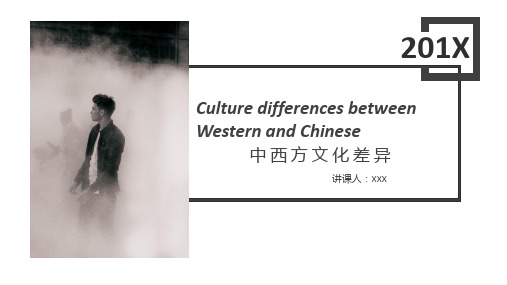
• In their opinion, one should choose
清 溪 山 房 位 于湖南 省长沙 市浏阳 市小河 乡田心 村125号
his food only according to his need as
an independent individual and the
balanced requirement of all kinds of
Chopsticks vs Knife and Fork
清 溪 山 房 位 于湖南 省长沙 市浏阳 市小河 乡田心 村125号
清 溪 山 房 位 于湖南 省长沙 市浏阳 市小河 乡田心 村125号
清 溪 山 房 位 于湖南 省长沙 市浏阳 市小河 乡田心 村125号
中西方文化差异
Chopsticks vs Knife and Fork
中西方文化差异
Tea and Wine
清 溪 山 房 位 于湖南 省长沙 市浏阳 市小河 乡田心 村125号
清 溪 山 房 位 于湖南 省长沙 市浏阳 市小河 乡田心 村125号
清 溪 山 房 位 于湖南 省长沙 市浏阳 市小河 乡田心 村125号
Chinese people love tea while westerners prefer to drink red wine
清 溪 山 房 位 于湖南 省长沙 市浏阳 市小河 乡田心 村125号
清 溪 山 房 位 于湖南 省长沙 市浏阳 市小河 乡田心 村125号
清 溪 山 房 位 于湖南 省长沙 市浏阳 市小河 乡田心 村125号
清 溪 山 房 位 于湖南 省长沙 市浏阳 市小河 乡田心 村125号
清 溪 山 房 位 于湖南 省长沙 市浏阳 市小河 乡田心 村125号
中西方文化差异(英文版ppt)

4. Thanks and Responses
In China,“Thank you” is not frequently used between intimate friends and family members because it may imply a certain distance between the addresser and the addressee. “Thank you” is widely used in English to show gratitude in such cases as being invited, helped, given a gift, etc.
Different cultural factors may result in cultural differences.
1.Cultural Background 2. Different values 3.Individualism and Collectivism 4. Family 5.Nationalism …
Cultural differences in politeness between western and Chinese
1.Greeting and Parting
• In China, When people meet acquaintances or friends, we always say ,“Have you eaten yet?” What are you going to do?” • In English, people often employ the following expressions to greet each other “Good morning/evening/afternoon. “Fine day, isn’t it? ”How is everything going?”,etc.
中西文化差异_英文演示课件.ppt
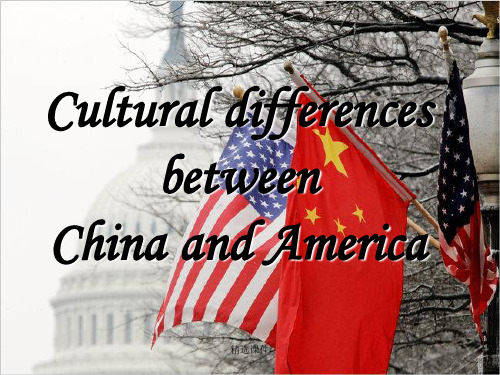
chu精选r课c件h?”
Invitation
• In the culture of British and America, it is very important to consult a time before you invite somebody to attend a banquet or take part in social activities. Esp. in America, invite somebody means you are borrow times of others. So they respect time very much. While in China, people are prefer to an uninvited guest.
精选课件
Thanks and Responses
• In China,“Thank you” is not frequently used between intimate friends and family members because it may imply a certain distance between the addresser and the addressee.
• An western hostesso glad that you liked it. I co精o选课k件it especially for you.”
• “Thank you” is widely used in English to show gratitude in such cases as being invited, helped, given a gift, etc.
精选课件
Asking Personal Affairs
Invitation
• In the culture of British and America, it is very important to consult a time before you invite somebody to attend a banquet or take part in social activities. Esp. in America, invite somebody means you are borrow times of others. So they respect time very much. While in China, people are prefer to an uninvited guest.
精选课件
Thanks and Responses
• In China,“Thank you” is not frequently used between intimate friends and family members because it may imply a certain distance between the addresser and the addressee.
• An western hostesso glad that you liked it. I co精o选课k件it especially for you.”
• “Thank you” is widely used in English to show gratitude in such cases as being invited, helped, given a gift, etc.
精选课件
Asking Personal Affairs
中西方文化差异英文版(课堂PPT)
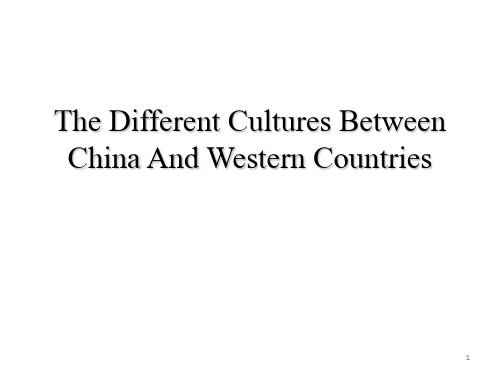
13
14
15
16
• Knives and forks • Chopsticks
17
18
Conclusion
• China is a country with one of the lo ngest histories in the world.
• We have Profound Traditional Cultures ,especially comparing with the Western Countries.
• Have you eaten yet? • What are you going to do?
4
Greeting in English
• People often employ the following expressions to greet each other :
• Good morning/evening/afternoon. • Fine day, isn’t it? • How is everything going?
5
Parting in English
• Western people always find some reasons for their leaving. Such as:
• “I am afraid I must be off, I have to …” • “Well, it’s been nice to see you again. I do
characters of a horoscope • Red clothes(the red color
represents lucky) • Bridal sedan chair • Cross-cupped wine
14
15
16
• Knives and forks • Chopsticks
17
18
Conclusion
• China is a country with one of the lo ngest histories in the world.
• We have Profound Traditional Cultures ,especially comparing with the Western Countries.
• Have you eaten yet? • What are you going to do?
4
Greeting in English
• People often employ the following expressions to greet each other :
• Good morning/evening/afternoon. • Fine day, isn’t it? • How is everything going?
5
Parting in English
• Western people always find some reasons for their leaving. Such as:
• “I am afraid I must be off, I have to …” • “Well, it’s been nice to see you again. I do
characters of a horoscope • Red clothes(the red color
represents lucky) • Bridal sedan chair • Cross-cupped wine
中西文化比较的英文ppt(中西文化对比) 30页PPT文档
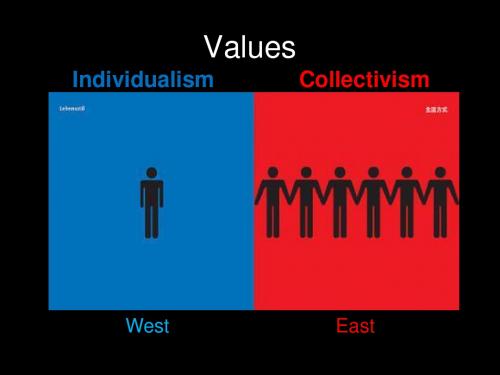
Why?
Sacrifice
There is a vast difference between the major philosophies of eastern and western life.
Westerners believe in self
dedication to achieve their goals of success and happiness
Pushing hands
《推手》
——李安
Introduction
•
When he arrived there, he In an American house, Mr. Zhu,
a retired man who lived more than half of his life in China, was moved to Ameri can to lived with his son together. couldn’t speak English and very unfamiliar to the new country. So he had to stay at home to show his Taijiquan, see Beijing Opera, or practice his handwriting. His son’s wife, Martha an American lady wh o always stay at home for writing essays by computer. Two people lived in the same house, but couldn’t communicate w ith each other. Martha didn’t understand why father must liv ed together with them, and because the different crosscultur al, different living habit and characteristic, led to many contr adiction between them.
Sacrifice
There is a vast difference between the major philosophies of eastern and western life.
Westerners believe in self
dedication to achieve their goals of success and happiness
Pushing hands
《推手》
——李安
Introduction
•
When he arrived there, he In an American house, Mr. Zhu,
a retired man who lived more than half of his life in China, was moved to Ameri can to lived with his son together. couldn’t speak English and very unfamiliar to the new country. So he had to stay at home to show his Taijiquan, see Beijing Opera, or practice his handwriting. His son’s wife, Martha an American lady wh o always stay at home for writing essays by computer. Two people lived in the same house, but couldn’t communicate w ith each other. Martha didn’t understand why father must liv ed together with them, and because the different crosscultur al, different living habit and characteristic, led to many contr adiction between them.
- 1、下载文档前请自行甄别文档内容的完整性,平台不提供额外的编辑、内容补充、找答案等附加服务。
- 2、"仅部分预览"的文档,不可在线预览部分如存在完整性等问题,可反馈申请退款(可完整预览的文档不适用该条件!)。
- 3、如文档侵犯您的权益,请联系客服反馈,我们会尽快为您处理(人工客服工作时间:9:00-18:30)。
The diet object
China
Western countries
China's cuisine is "taste", so Westerners think the cuisine
the Chinese cooking at the is eat, so a large piece of meat-
Using the encouraging language.
Pay great attention to individual quality and the emotional communication.
Eating and drinking
Section one
Section two
Section three
The western people’s opinion about loving is that “if we are well acquainted with each other ,let us go together.”And they will not contact loving with marriage.
The diet concept
China
Western countries
Chinese food pay more attention to color, aroma, taste, and shape rather than nutrition.
Western food is a rational concept. They think the food’s nutrition is the most important.
selected materials show great eating, whole chickens and
randomness
other "hard food."
The diet object
China
Western countries
The diet ways
China
Western countries
Loving and marriage
Section one
Section two
Section three
Loving attitude
China
Western countries
The people in China hold the idea that loving is very holy and they think loving is the prelude(前奏)of the marriage .
In China, a banquet, no matter what purpose, only have one form that we lost in a fog sitting around, sharing one seat . And people in China use chopsticks to eat what they want .
Our topic:
The culture difference between china and westes
Section one
Section two
Section three
Education Eating and drinking Loving and marriage
In American the bride always in her white wedding gown and their wedding will be host in a church.
Marriage ways
China
Western countries
brief sum-up
At last ,I sum up the culture difference between china and the western countries in one sentence : Chinese people pay attention to “Heaven”(天人合一), Westerners focus on “people-oriented” (以人为本).
Western-style banquets, friendship is the core of the banquet, with guests sitting next to the conversation between the purpose of friendship . They use knife and fork to eat instead of chopsticks .
Marriage ways
China
Western countries
In China the bride and bridegroom would in red ,because we believe the red color represents lucky and the wedding would be host in the bridegroom’s house .
China
Western
Vs
countries
Education
Section one
Section two
Section three
Education punishment
China
Western countries
Emphasize reserve .
One can not become a useful person without being beaten.
• Group members : Liuchenxu Baishuangcheng Meiqibing Chenyihui Liliangxiu Duanqingqi
